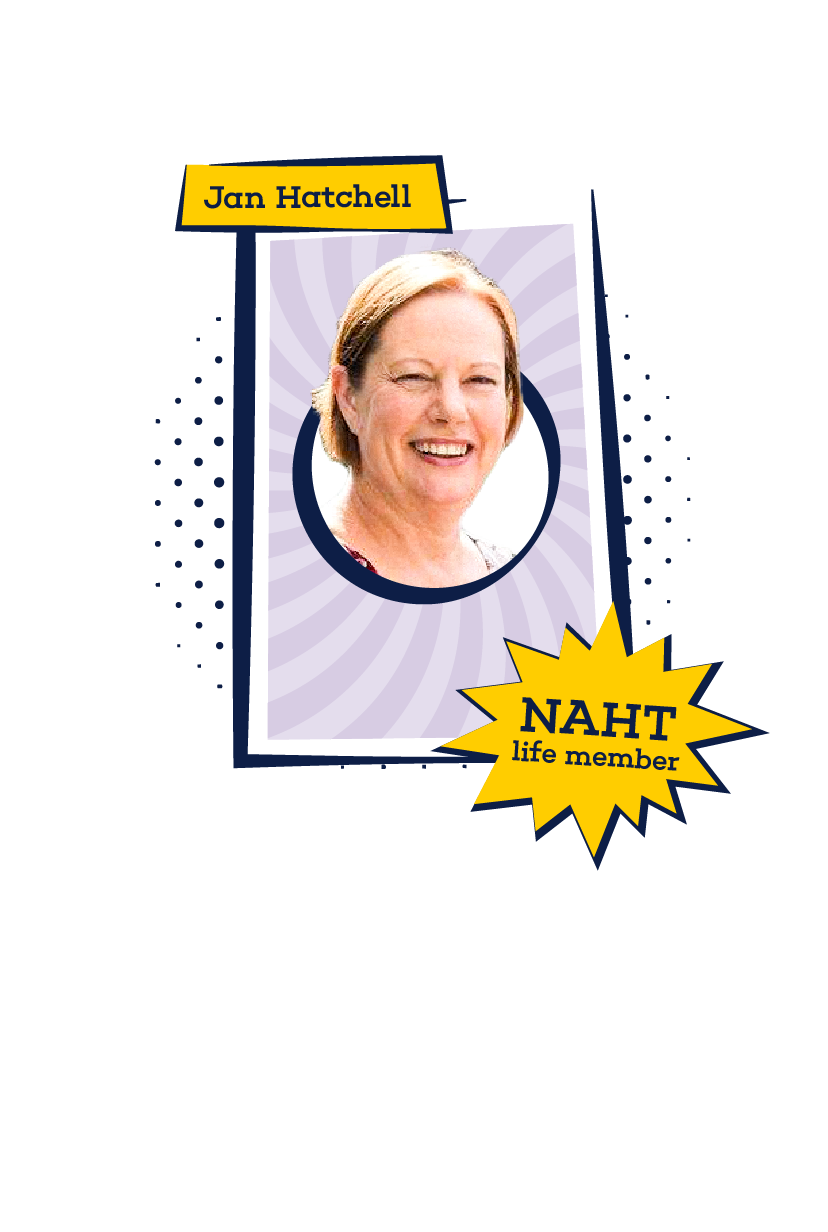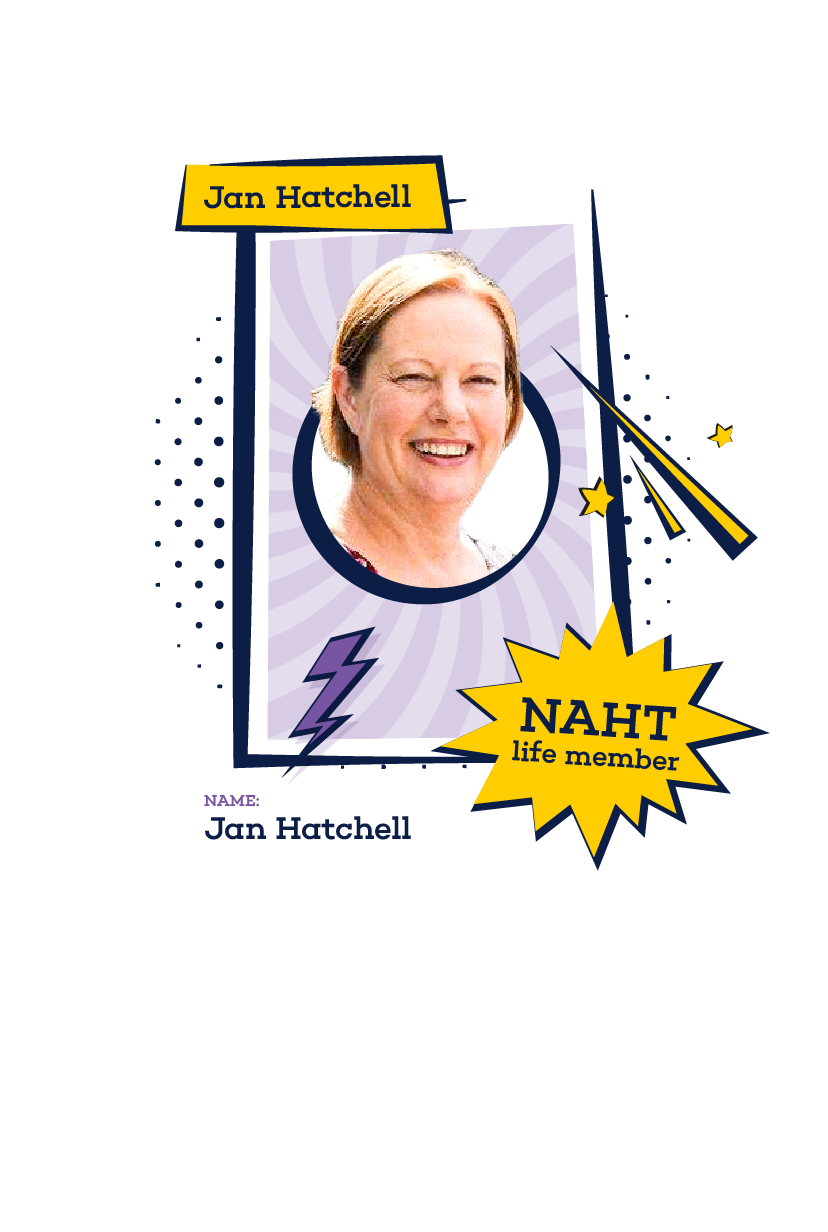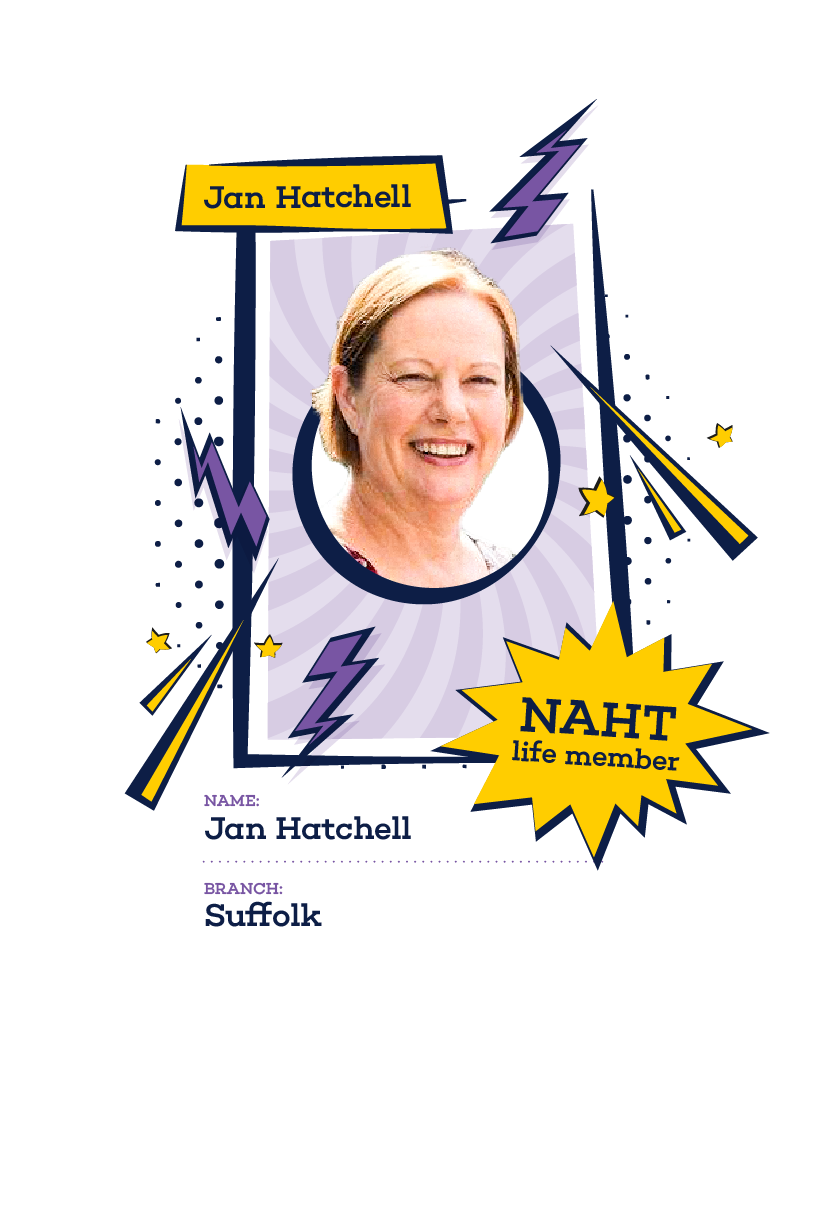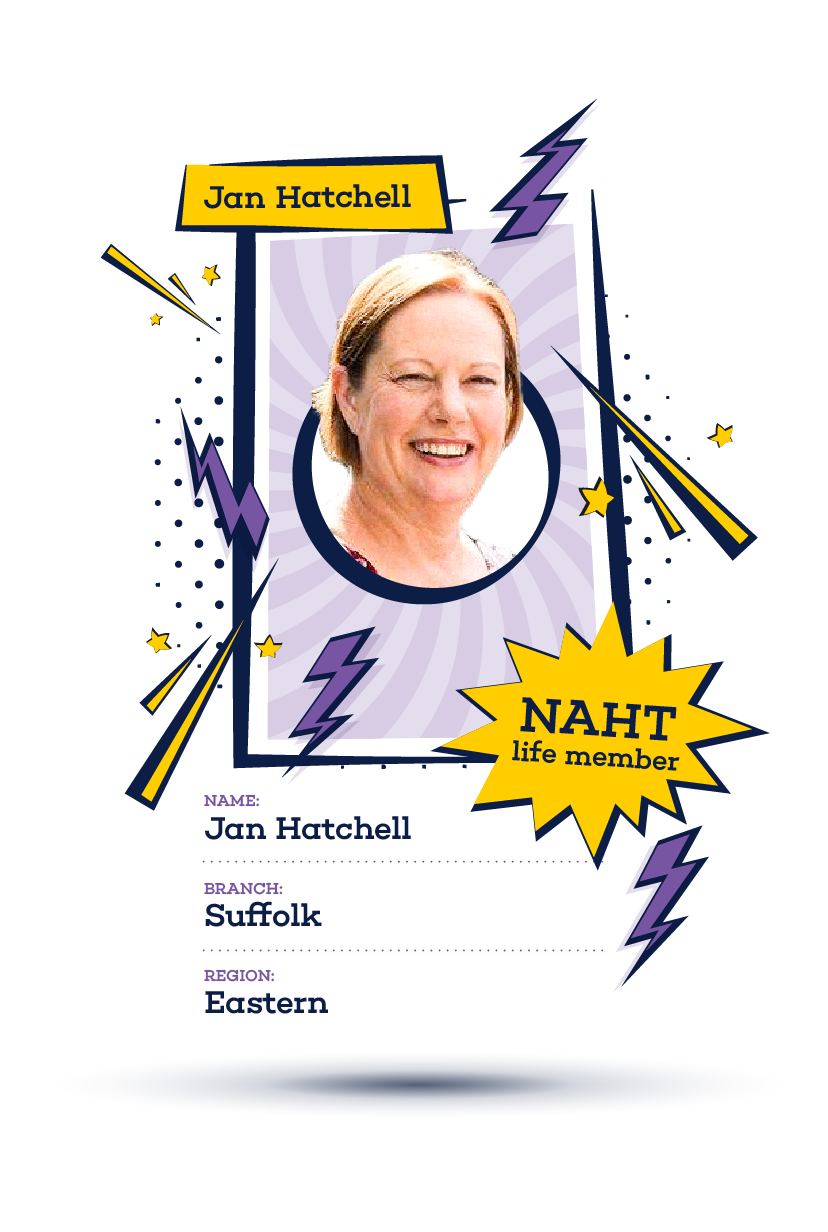
Journalist Nic Paton looks at the vital role lay officials play in supporting members across the full spectrum of employment issues.

Supporting members when it matters most
NAHT not only leads impactful campaigns to shape the future of education but also provides vital, day-to-day protection that safeguards members when they need it most.
Whether it’s via NAHT’s legal team or specialist advisers, school leaders have the peace of mind that support, advice and guidance will be there for them should they encounter professional, legal, employment or even personal problems during their careers.
BEVERLEY HAYWOOD,
NAHT REGIONAL HEAD (EASTERN)
One rung down from this very specialist support, however, is the work of NAHT’s lay officials. Delivered by volunteer members through NAHT’s branch and regional network, lay officials are – as Beverley Haywood, NAHT regional head (Eastern) puts it – “quite often the unsung heroes of our union”.
Lay officials, she explains, support members across the whole spectrum of employment issues, for example, grievances against them, grievances they want to lodge, disciplinary concerns, parental concerns and so on. “So, everything and anything to do with employment,” Beverley says.

Experience that stays in the profession
Moreover, because lay officials are a combination of life members and serving members, they are a vital way for NAHT to hold on to and maximise the decades of professional experience that life members can bring to the table.
PAUL WHITEMAN,
NAHT GENERAL SECRETARY
Being a lay official enables NAHT to ensure all that knowledge, all those years of leadership, are not lost to the profession just because the ‘R’ word (retirement) has raised its head. Moreover, they are an important way of enabling NAHT to stay connected to members on the ground, as NAHT general secretary Paul Whiteman explains.
“We have a really healthy mix now of local lay officials, between those who are still serving and those who are life members,” he tells Leadership Focus.
“Life members, especially, have all that experience – they are really seasoned professionals. Often, they have more time and space to participate. If we can get that balance, the rich support we can bring to members is so very, very important.
“Just as importantly, lay officials help keep the union local to members. They are someone you may recognise – perhaps they’re retired, but you’ve known them in the past, or perhaps they’re still working at a school down the road from you. Either way, being able to talk directly to these respected, experienced peers about whatever your issues are is so powerful. It is what keeps the union local and relevant,” Paul adds.

Experience that stays in the profession
Moreover, because lay officials are a combination of life members and serving members, they are a vital way for NAHT to hold on to and maximise the decades of professional experience that life members can bring to the table.
PAUL WHITEMAN,
NAHT GENERAL SECRETARY
Being a lay official enables NAHT to ensure all that knowledge, all those years of leadership, are not lost to the profession just because the ‘R’ word (retirement) has raised its head. Moreover, they are an important way of enabling NAHT to stay connected to members on the ground, as NAHT general secretary Paul Whiteman explains.
“We have a really healthy mix now of local lay officials, between those who are still serving and those who are life members,” he tells Leadership Focus.
“Life members, especially, have all that experience – they are really seasoned professionals. Often, they have more time and space to participate. If we can get that balance, the rich support we can bring to members is so very, very important.
“Just as importantly, lay officials help keep the union local to members. They are someone you may recognise – perhaps they’re retired, but you’ve known them in the past, or perhaps they’re still working at a school down the road from you. Either way, being able to talk directly to these respected, experienced peers about whatever your issues are is so powerful. It is what keeps the union local and relevant,” Paul adds.

Giving back and making a difference
“I see the role very much as listening, taking notes and – if necessary – mopping up the tears; just being someone who can sit and listen,” agrees NAHT life member and lay official for the Eastern region Jan Hatchell. “But also, where necessary, it is about delivering a reality check, so saying, ‘I agree this feels unfair, but this is what the situation is’.”
Jan retired to Suffolk two years ago after 40 years of teaching in – and leading – special educational needs and disabilities (SEND) schools, including in Sheffield and Norfolk. The term ‘retired’ probably needs to be used quite loosely in this context, as she explains, because she also works as a SEND consultant and serves as a lay official for about a day a week.
“I have retired, and I am aware that I am lucky to have a lovely pension, which allows me to do a lot of different things. I also have a lot of experience I can draw on,” she says.
“One of the things about being a life member is you’ve done your years (I worked in schools for 40 years after all), so I can now give something back and support other people. It shouldn’t be just one way,” she adds.
“The value [of being a lay official] is in supporting colleagues – especially those who are perhaps less experienced in the profession – as they deal with tricky situations. So, therefore, they continue to enjoy their role, stay in post and have longevity in their careers,” agrees Jeff Conquest, head teacher of Woodland Middle School in Flitwick, Bedfordshire – an example of a lay official (again for the Eastern region) who is also a serving member.
“For me, the casework I do is the best part of being a branch official. It makes me feel good to be helping other people, and I am also learning from the experience. It has given me a really positive standing within our community of members and head teachers, and it has allowed me to apply the learning back into my own workplace,” he adds.
Giving back and making a difference
“I see the role very much as listening, taking notes and – if necessary – mopping up the tears; just being someone who can sit and listen,” agrees NAHT life member and lay official for the Eastern region Jan Hatchell. “But also, where necessary, it is about delivering a reality check, so saying, ‘I agree this feels unfair, but this is what the situation is’.”
Jan retired to Suffolk two years ago after 40 years of teaching in – and leading – special educational needs and disabilities (SEND) schools, including in Sheffield and Norfolk. The term ‘retired’ probably needs to be used quite loosely in this context, as she explains, because she also works as a SEND consultant and serves as a lay official for about a day a week.
“I have retired, and I am aware that I am lucky to have a lovely pension, which allows me to do a lot of different things. I also have a lot of experience I can draw on,” she says.
“One of the things about being a life member is you’ve done your years (I worked in schools for 40 years after all), so I can now give something back and support other people. It shouldn’t be just one way,” she adds.
“The value [of being a lay official] is in supporting colleagues – especially those who are perhaps less experienced in the profession – as they deal with tricky situations. So, therefore, they continue to enjoy their role, stay in post and have longevity in their careers,” agrees Jeff Conquest, head teacher of Woodland Middle School in Flitwick, Bedfordshire – an example of a lay official (again for the Eastern region) who is also a serving member.
“For me, the casework I do is the best part of being a branch official. It makes me feel good to be helping other people, and I am also learning from the experience. It has given me a really positive standing within our community of members and head teachers, and it has allowed me to apply the learning back into my own workplace,” he adds.
A peer network that listens and learns
“You are the conduit between the member and the employer, so you talk to both,” emphasises Jan. “I managed, for example, to get a really good deal for one member because I was proactive both ways, and I didn’t try to make it all about ‘you can’t do this to my member’.
“I sat down with them to work out how to find a solution that was going to work for both sides while also supporting the member. I am proud of the fact that everyone I have supported has come back and gone, ‘Jan, thank you; I could not have done that without you’.
“I also attend a lot of joint negotiating committee meetings; I pretty much do one of those every Wednesday. That is when you sit with the employers, go through their policies and identify any issues. You are there to represent members rather than one specific member. For instance, helping ensure parental leave policies are easier to follow, understand or act on.
“It is a commitment, but I love it; I know I am making a difference to fellow school leaders as well as working with the other unions so that we are all working together,” Jan adds.
The online training NAHT offers to all lay officials before they start in their volunteering role is comprehensive and practical, highlights Jeff, adding that it is effectively free continuing professional development that also allows you to sit back and reflect on your own leadership.
“Once you’ve done the training, it is then a matter of simply putting yourself out there. If you couch the advice in terms of ‘Well, this is how I would deal with it’ or ‘This is what the policy says’, you don’t have to set yourself up as someone who knows all the answers. You are simply talking to them from your experience as a peer sounding board,” he explains.
“It is important, however, that I know where my line is. For example, I supported one colleague in the investigation stage of an issue, hoping we could bat it all away for them. But it progressed to a disciplinary action, at which point I had to step back. There is a point where NAHT’s team has to take things on,” he says.
“It is about understanding when to step back and say, ‘This needs to go to the legal team’, when it needs to go up another layer,” agrees Jan.
“In terms of the actual time it takes, more often than not, it is simply a phone call, perhaps 20 minutes or so,” Jeff adds, highlighting a call in fact that he has just come from.
“They were having to go to a panel of governors over a parental grievance and wanted to get a sense of what that would be like, what they needed to prepare and so on. So it was about coaching them on how it was going to feel and what to accept and what not to accept.
“Other cases can be quite time-consuming. I’ve, on occasions, taken time out to actually drive members to meetings myself, for example, when it has been too much for them. I get great satisfaction from knowing I’ve helped someone through a difficult period,” Jeff adds.
“I am a social person – I don’t think you go into education if you’re not – so I enjoy the opportunity to talk to people, engage with them and support them,” agrees Jan in conclusion.
“If you’re about to go into retirement or in your last few years of school leadership, getting involved with your branch and then taking on some of that support can be so rewarding. But there are not enough of us doing this.”
NAHT is keen to expand its network of lay officials. If you want to become a lay official for your branch or region or want to learn more, contact organising@naht.org.uk
A peer network that listens and learns
“You are the conduit between the member and the employer, so you talk to both,” emphasises Jan. “I managed, for example, to get a really good deal for one member because I was proactive both ways, and I didn’t try to make it all about ‘you can’t do this to my member’.
“I sat down with them to work out how to find a solution that was going to work for both sides while also supporting the member. I am proud of the fact that everyone I have supported has come back and gone, ‘Jan, thank you; I could not have done that without you’.
“I also attend a lot of joint negotiating committee meetings; I pretty much do one of those every Wednesday. That is when you sit with the employers, go through their policies and identify any issues. You are there to represent members rather than one specific member. For instance, helping ensure parental leave policies are easier to follow, understand or act on.
“It is a commitment, but I love it; I know I am making a difference to fellow school leaders as well as working with the other unions so that we are all working together,” Jan adds.
The online training NAHT offers to all lay officials before they start in their volunteering role is comprehensive and practical, highlights Jeff, adding that it is effectively free continuing professional development that also allows you to sit back and reflect on your own leadership.
“Once you’ve done the training, it is then a matter of simply putting yourself out there. If you couch the advice in terms of ‘Well, this is how I would deal with it’ or ‘This is what the policy says’, you don’t have to set yourself up as someone who knows all the answers. You are simply talking to them from your experience as a peer sounding board,” he explains.
“It is important, however, that I know where my line is. For example, I supported one colleague in the investigation stage of an issue, hoping we could bat it all away for them. But it progressed to a disciplinary action, at which point I had to step back. There is a point where NAHT’s team has to take things on,” he says.
“It is about understanding when to step back and say, ‘This needs to go to the legal team’, when it needs to go up another layer,” agrees Jan.
“In terms of the actual time it takes, more often than not, it is simply a phone call, perhaps 20 minutes or so,” Jeff adds, highlighting a call in fact that he has just come from.
“They were having to go to a panel of governors over a parental grievance and wanted to get a sense of what that would be like, what they needed to prepare and so on. So it was about coaching them on how it was going to feel and what to accept and what not to accept.
“Other cases can be quite time-consuming. I’ve, on occasions, taken time out to actually drive members to meetings myself, for example, when it has been too much for them. I get great satisfaction from knowing I’ve helped someone through a difficult period,” Jeff adds.
“I am a social person – I don’t think you go into education if you’re not – so I enjoy the opportunity to talk to people, engage with them and support them,” agrees Jan in conclusion.
“If you’re about to go into retirement or in your last few years of school leadership, getting involved with your branch and then taking on some of that support can be so rewarding. But there are not enough of us doing this.”
NAHT is keen to expand its network of lay officials. If you want to become a lay official for your branch or region or want to learn more, contact
organising@naht.org.uk

Stay protected in retirement
We’ve seen how our lay officials (life and serving members) stand up to protect members – now, here’s how we continue to protect you in retirement.
Life members may no longer need support with workplace issues, but NAHT’s commitment doesn’t stop at the school gates. As a regulated profession, teaching responsibilities can follow you into retirement, and when they do, NAHT is here to help.
Retired school leaders can still be referred to the Teaching Regulation Agency (TRA), where investigations are often complex and lengthy. Our team supports life members through every stage of the process, working to resolve matters swiftly while securing the best possible outcomes.
Life members may also require enhanced Disclosure and Barring Service (DBS) checks, especially if taking on voluntary or community roles. NAHT provides guidance where concerns arise, such as challenging soft information disclosures.
In rare and difficult situations, some life members may be contacted by the police about historical allegations or asked to act as witnesses in criminal proceedings. In both cases, NAHT offers legal advice and representation to ensure our members are supported and reassured.
Life membership means lifelong support from a union that’s with you every step of the way.
As one life member tells Leadership Focus: “NAHT did more than just handle my case with professional expertise – I also found the legal officer showed real empathy and support for the circumstances I found myself in and was encouraging throughout.
“There were times when I felt particularly lonely and isolated in the last three years, but I never felt completely alone because I knew NAHT was there working on my behalf.
“I felt that NAHT had my back at all times, worked hard and provided me with the feedback and encouragement I needed to get through the process.
“Typical of the legal officer’s thoughtfulness, towards the end of the process, they phoned to let me know the TRA had come to a conclusion – knowing I had not seen the email, they asked if I wanted them to read it to me. I did, and I am so grateful that they immediately let me know the result,” they add.
If you’re approaching retirement or already retired and want to learn more about the benefits of life membership, visit www.naht.org.uk/lifemembers




Stay protected in retirement
We’ve seen how our lay officials (life and serving members) stand up to protect members – now, here’s how we continue to protect you in retirement.
Life members may no longer need support with workplace issues, but NAHT’s commitment doesn’t stop at the school gates. As a regulated profession, teaching responsibilities can follow you into retirement, and when they do, NAHT is here to help.
Retired school leaders can still be referred to the Teaching Regulation Agency (TRA), where investigations are often complex and lengthy. Our team supports life members through every stage of the process, working to resolve matters swiftly while securing the best possible outcomes.
Life members may also require enhanced Disclosure and Barring Service (DBS) checks, especially if taking on voluntary or community roles. NAHT provides guidance where concerns arise, such as challenging soft information disclosures.
In rare and difficult situations, some life members may be contacted by the police about historical allegations or asked to act as witnesses in criminal proceedings. In both cases, NAHT offers legal advice and representation to ensure our members are supported and reassured.
Life membership means lifelong support from a union that’s with you every step of the way.
As one life member tells Leadership Focus: “NAHT did more than just handle my case with professional expertise – I also found the legal officer showed real empathy and support for the circumstances I found myself in and was encouraging throughout.
“There were times when I felt particularly lonely and isolated in the last three years, but I never felt completely alone because I knew NAHT was there working on my behalf.
“I felt that NAHT had my back at all times, worked hard and provided me with the feedback and encouragement I needed to get through the process.
“Typical of the legal officer’s thoughtfulness, towards the end of the process, they phoned to let me know the TRA had come to a conclusion – knowing I had not seen the email, they asked if I wanted them to read it to me. I did, and I am so grateful that they immediately let me know the result,” they add.
If you’re approaching retirement or already retired and want to learn more about the benefits of life membership, visit www.naht.org.uk/lifemembers

















